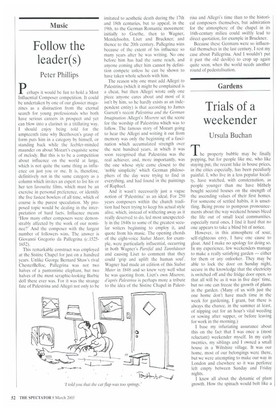Follow the leader(s)
Peter Phillips
P
erhaps it would be fun to hold a Most Influential Composer competition. It could be undertaken by one of our glossier magazines as a distraction from the eternal search for young professionals who both have serious careers in prospect and yet can blow into a clarinet in a titillating way. I should enjoy being told for the umpteenth time why Beethoven's grasp of form puts him in a category by himself, or standing back while the feebler-minded maunder on about Mozart's exquisite sense of melody. But this is to be a competition about influence on the world at large, which is not quite the same thing as influence on just you or me. It is, therefore, definitively not in the same category as a column which invites an expert to list his or her ten favourite films, which must be an exercise in personal preference, or identify the five fastest bowlers of all time, which of course is the purest speculation. My proposed topic would be dealing in the interpretation of hard facts. Influence means 'How many other composers were demonstrably affected by the work of our nominee?' And the composer with the largest number of followers wins. The answer is Giovanni Gregorio da Pallegrina (c.15251652).
This remarkable construct was employed at the Sistine Chapel for just on a hundred years. Unlike George Bernard Shaw's rival ChesterBelloc. Pallegrina was not two halves of a pantomime elephant. but two halves of the most seraphic-looking Barbie doll there ever was. For it was the strange fate of Palestrina and Allegri not only to be imitated to aesthetic death during the 17th and 18th centuries, but to appeal, in the 19th, to the German Romantic movement: initially to Goethe, then to Wagner, Mendelssohn, Liszt and Bruckner; and thence to the 20th century. Pallegrina wins because of the extent of his influence so many years after he was writing. No one before him has had the same reach, and anyone coming after him cannot by definition compete unless he can be shown to have taken whole schools with him.
The reason why one must add Allegri to Palestrina (which it might be complained is a cheat, but then Allegri wrote only one piece anyone cares about and most of it isn't by him. so he hardly exists as an independent entity) is that according to James Garrett's recent Palestrina and the German Imagination Allegri's Miserere set the scene for the worship of Palestrina which was to follow, The famous story of Mozart going to hear the Allegri and writing it out from memory was only the beginning of a fascination which accumulated strength over the next hundred years, in which it was soon recognised that Palestrina was the real achiever, and, more importantly, was the one whose style came closest to the 'noble simplicity' which German philosophers of the day were trying to find in everything, and had found in the paintings of Raphael.
And it wasn't necessarily just a vague notion of `Palestrina' as an ideal. For 250 years composers within the church tradition had been trying to keep his actual style alive, which, instead of withering away as it really deserved to do, led most unexpectedly in the 1840s to some of the greatest secular writers beginning to employ it, and quote from his music. The opening chords of the eight-voice Stabat Mater, for example, were particularly influential, occurring in both Wagner's Parsifal and Tannhauser and causing Liszt to comment that they could 'grip and uplift the human soul'. Wagner had made an edition of this Stabat Mater in 1848 and so knew very well what he was quoting from. Liszt's own Miserere, d'apres Palestrina is perhaps more a tribute to the idea of the Sistine Chapel in Palest
rina and Allegifs time than to the historical composers themselves, but admiration for the atmosphere of the chapel in its 16th-century milieu could swiftly lead to direct quotation, for example in Bruckner.
Because these Germans were so influential themselves in the last century, I rest my case about Pallegrina. And I wouldn't put it past the old devil(s) to crop up again quite soon, when the world needs another round of pedestalisation.


































































 Previous page
Previous page